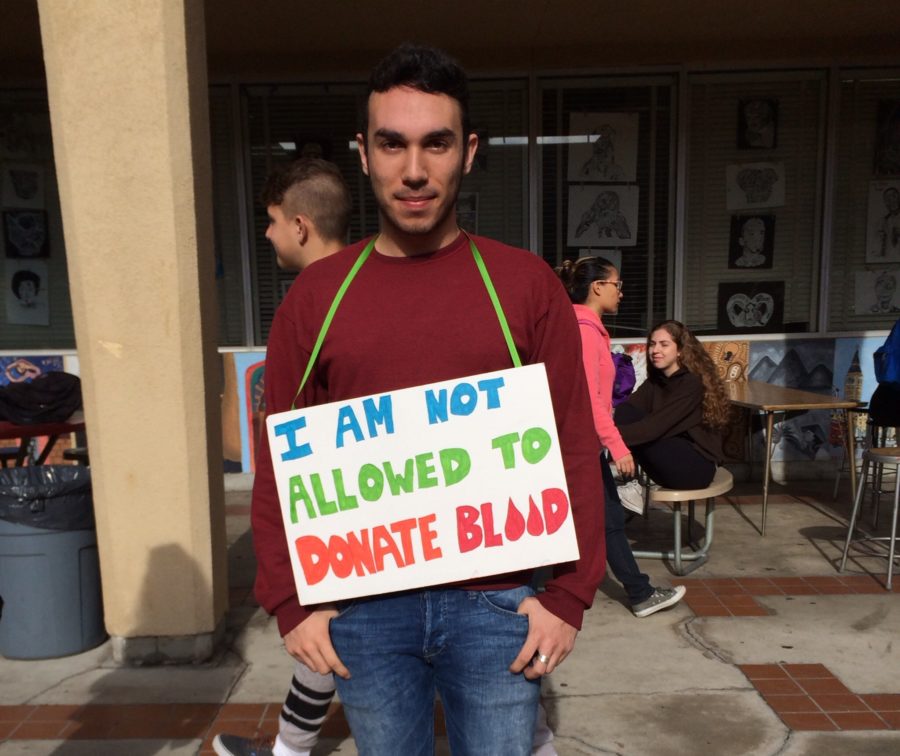Brenna Nouray, Watchtower yearbook staff writer
The day of the yearly blood drive, Dec. 4, senior Aaron Azizi was seen walking around campus with a sign that read, “I am not allowed to donate blood.”
According to the U.S. Food and Drug Administration, men who have had sex with another male, even protected, cannot donate blood. This policy was issued in 1979 close to when the United States experienced its HIV/AIDS epidemic. This policy was instituted because men who have had male-on-male sex are more susceptible to disease than men who have not.
At the time, just in Los Angeles, the probability of a donor having HIV was approximately 1 in 100.
According to Linda Goss, one of the UCLA nurses that was present during the blood drive, “it’s a numbers’ issue.”
“In the 80s, 10,000 people contracted AIDS from blood transfusions before they figured out that there was a connection. The medical community is very conservative about protecting the blood supply, not just from AIDS but from all STDs. They [the FDA] are about to change the law to [say that] instead of someone who has had male-to-male sex be deferred for his lifetime, it will be for only a year. This still doesn’t have a huge impact,” Goss said.
Testing has greatly improved since then and, according blood drive director Cathleen Davidson, the likelihood of someone contracting an STD through blood transfusions now is close to nothing. It is estimated that the HIV risk from a unit of blood has been reduced to about 1 per 2 million in America.
“Disease does not discriminate,” Azizi said.
So why the constriction of only men engaged in male sex? Men with a history of male-to-male sex are the group most severely affected by HIV.
UCLA medical director Alyssa Ziman feels as though there should be some restriction as to whether a male who has had male-to-male sex should donate blood.
“Our patients deserve the safest blood and our main concern is to protect the blood supply. MSM are, as a group, at increased risk for HIV, hepatitis B and certain other infections that can be transmitted by transfusion,” Ziman said. “Testing is very efficient, however there can be false negative test results. These false negative results may be due to the “window period”, the time after a person is infected during which they won’t test positive. For example, it takes a certain number of viruses in a donor’s blood for the test to detect the virus and determine if someone is positive. If someone doesn’t have that many viruses, the test might come out as negative.”
Davidson thinks otherwise and said, “I think [the law] is prejudicial, to be perfectly honest. It doesn’t make sense. I understand the reasons behind it, but I believe this deferral with some of the other ones we have in place don’t really make sense and that there should be some follow up questions.”
Azizi, an openly homosexual man, displayed his distaste for this treatment by wearing a sign on the day of the blood drive.
“I’ve known about it [the law] for a while, but I didn’t think it was true because I didn’t look into it. I was told a couple weeks before the drive that I was not able to donate and it made me really upset how I was told. I was told insincerely by an ASB member when I would have preferred if I had been told by an adult,” Azizi said.
Azizi mainly got positive comments regarding his “I am not allowed to donate blood sign” from both the faculty and the students. But there were some who didn’t think the sign was a good idea.
“I got criticism mainly from freshmen who were ignorant on the subject. Even a person in my grade mentioned to me how it was unnecessary, but I do not take criticism unless its constructive,” Azizi said.
This was not the only time when Azizi was not treated equally because of his sexuality. Even during school hours, Azizi feels a “little tension” from people around him, mostly heterosexual males.
“I’ve noticed that I don’t mesh well straight men probably because of homophobia. They don’t take me seriously and make stupid jokes,” Azizi said. “Right now I’m in a group project and they’re telling me to just ‘sit down’ and ‘we’ll handle everything’ as if I’m not important.”
The Americans Blood Center, the American Association of Blood Banks and the American Red Cross have all made a joint statement to change the current indefinite deferral to a one-year-deferral.
“I think that the current recommendation to create a one year deferral is appropriate,” Ziman said.
The Health and Human Service’s Advisory Committee on Blood Safety and Availability met to discuss the change of the FDA ruling taking in regard the questions surrounding risk involved and threats to the blood supply.
Several other countries have moved from lifetime to fixed-period MSM deferrals including the UK, Australia, Canada and Japan.
“It’s 2014,” Azizi said. “I sadly expected this from the society we live in, but I truly wish to make change.”
UPDATE: The FDA has proposed an end to the lifetime ban on gay blood donors, as of Tuesday, Dec. 23.
Categories:
Homosexual student barred from blood donation
December 18, 2014
0
Donate to Highlights
$125
$1000
Contributed
Our Goal
Your donation will support the student journalists of Beverly Hills High School. Your contribution will allow us to purchase equipment and cover our annual website hosting costs.
More to Discover





























